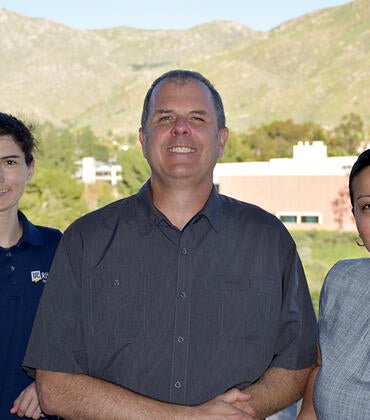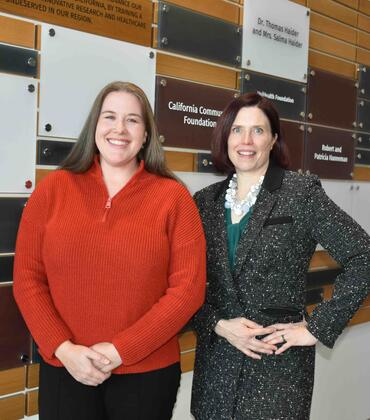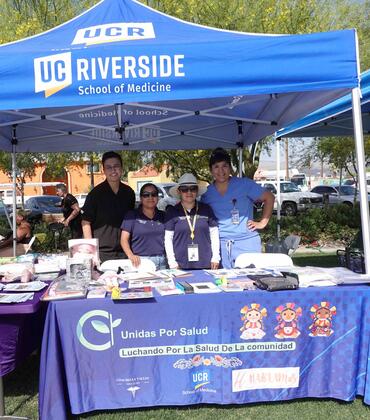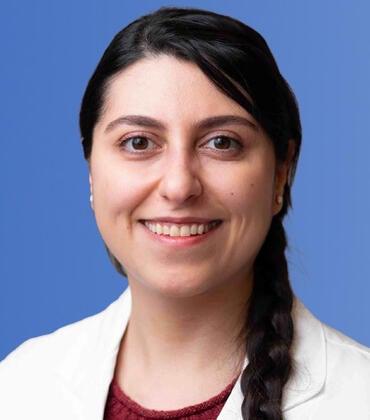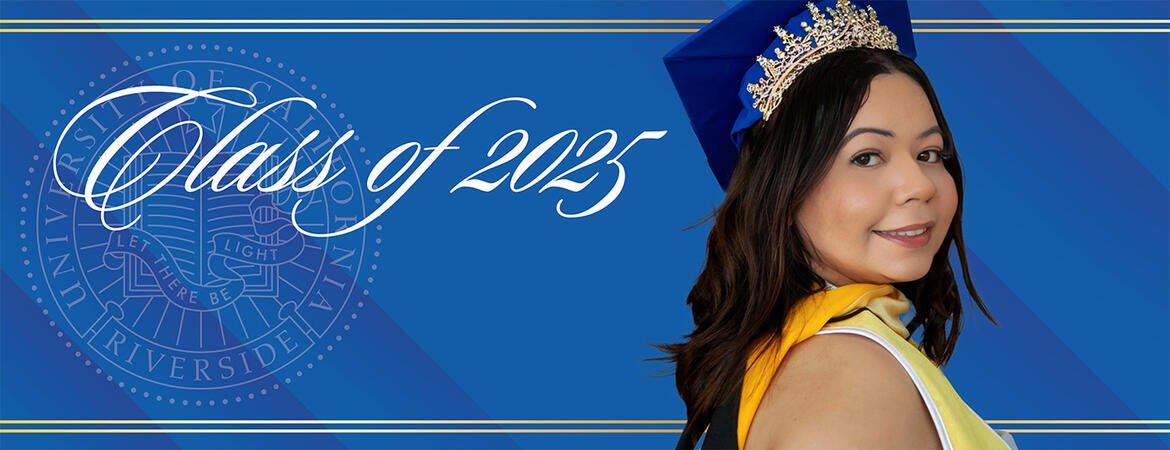
A few months ago, a patient at the Coachella Valley Free Clinic had an uncommon reaction to a routine blood pressure test. Seeing the high blood pressure reading, the patient began hyperventilating until UC Riverside biomedical sciences master’s student Valeria Barrientos spoke to her in Spanish, helping to calm her down.
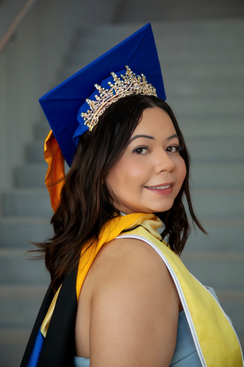
“These types of patients really made an impact on me because they're a reflection of somebody who could have been my mom or my aunt,” said Barrientos, who grew up in El Salvador before moving to California and earning her undergraduate degree in microbiology from UCR. “Even if patients understand English, there’s a comfort that comes from being spoken to in your native language, and I feel honored to provide them with that sense of belonging.”
For Barrientos, working directly with patients solidified her decision to become a doctor. While she knew she wanted to help people in the Inland Empire, Barrientos was initially unsure whether to do so through research or treating patients. She enrolled in UCR’s biomedical sciences master’s program to help her decide.
The two-year master’s program allowed Barrientos to continue her undergraduate research on lung inflammation and tissue repair with Meera G. Nair, PhD, professor of biomedical sciences. She also collaborated with Erica Heinrich, PhD, assistant professor of biomedical sciences on a clinical research project investigating the long-term effects of COVID-19 symptoms among patients in the Inland Empire, giving her a chance to interact with patients directly. “I realized that I enjoyed the clinical aspects and having that constant communication with patients,” Barrientos said.
As Barrientos leaned into primary care, she also explored other aspects of healthcare by taking classes through the SOM’s new master of public health program and volunteering at the Coachella Valley Free Clinic. At the clinic, Barrientos found she was uniquely suited to working with immigrant patients as a Spanish speaker and undocumented person herself. She also discovered that she could help patients by approaching them in a holistic way, not only providing preventive care but understanding and addressing basic needs like food resources, housing, and immigration consultation. “To me, the most appealing aspect of pursuing primary care is supporting patients beyond the clinical setting by addressing the broader social and structural factors that impact their health,” Barrientos explained.
Giving and receiving inspiration
Volunteering at the clinic not only let Barrientos help patients; it also inspired her to persist in earning her degree. “The patients I served became my motivation to keep pushing forward,” Barrientos said.
Barrientos’ status as an undocumented student meant she was ineligible for federal financial aid, giving her additional challenges to overcome to attend college. Despite being unemployed, she had to secure thousands of dollars each quarter to pay for on-campus housing and tuition. “Sometimes I would be in class and I would be thinking, ‘I need to get $6,000 by next week,’ and I just couldn't focus,” recalled Barrientos, adding that she nearly lost her campus housing twice because of her financial situation.
“The unwavering support I received from the school is what made this all possible,” Barrientos said. Scholarships, grants, and opportunities from UCR, including a research stipend and a paid internship on campus, helped Barrientos afford her undergraduate and master’s degrees. She expressed gratitude to mentors like Nair, Teresa Cofield, director of Pathway Programs at the SOM, and Hermila Torres, graduate student services advisor in biomedical sciences, for regularly checking in on her.
“I really admired her positivity and perseverance throughout this, and really trying to see this degree through, and her goal to ultimately get to medical school,” Torres said. “We were definitely all rooting for her.”
“I am so thankful to have them as my UCR family,” Barrientos said of her mentors. She also credited UCR’s inclusiveness for allowing her to participate in all programs regardless of her immigration status. “I'm graduating with a strong support system that has shaped my future, and I aspire to be a leader like them and pay this forward,” she said.
Advocating for the immigrant community
Throughout her time in school, Barrientos used a variety of platforms to advocate for undocumented students and patients like herself. This included student panels and symposium presentations as a graduate student, as well as a lobbying trip to Washington, DC with UCR Chancellor Kim A. Wilcox a few months before she started her master’s program, where she met representatives including Senator Alex Padilla, Representative Raul Ruiz, and Representative Alexandria Ocasio-Cortez.
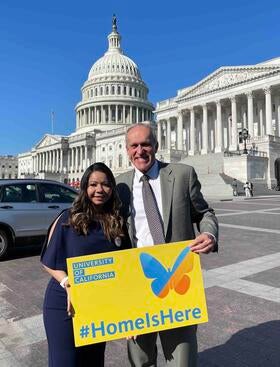
“Doing presentations and being able to express that there are concerns when it comes to healthcare for undocumented patients was very important to me,” she said, pointing to healthcare challenges for undocumented people such as barriers to receiving organ transplants. “I feel like this program gave me the opportunity to be able to speak out for my community, whose struggles I understand intimately and whose voices are too often unheard.”
Now that she has completed her master’s degree and set her goal of becoming a doctor, Barrientos hopes to remain at UCR for medical school, advocating and eventually providing primary care for the local immigrant community. “I want to be someone who stands beside them and speaks up for their needs,” she said, “because I’ve lived many of their struggles, I understand their fears, and that connection allows me to care for them in a way that feels personal, not distant.”
This goes beyond speaking a shared language. Barrientos gave an example of an undocumented patient with kidney disease potentially needing to choose between working, as their immigration status would make them ineligible for unemployment benefits, or receiving time-intensive dialysis for their health condition. “These systemic barriers don’t just limit access to care, they compromise patient compliance and survival,” she said. “Recognizing these realities is essential to truly advocating for our patients, and that can only be achieved by establishing a strong rapport rooted in trust and understanding.”
“Ideally, I hope to come back to the UCR School of Medicine because its commitment to health equity and community-centered care aligns with my values,” Barrientos continued. After her family moved to Los Angeles when she was younger and she spent her undergraduate and graduate years at UCR, she expressed her commitment to the local area. “The Inland Empire has become more than just where I live, it’s where I’ve grown, learned, and found a sense of purpose,” Barrientos said. “It’s here that I hope to continue serving, growing, and giving back as a future physician.”
Helping patients now
As a physician, Barrientos hopes in the future to use her interest and background in research to collect data and advocate for policy changes, particularly healthcare protections, at a legislative level.
Still, she said her UCR master’s program taught her that she doesn’t need to wait until she earns her medical degree to work toward change. “When I was an undergrad, I used to say, ‘One day, when I become a doctor, I’ll be able to help,’” she said. “But this master's taught me that I can start doing this work even as a student, and it can bring an impact to the people in this area.”
She plans to begin this summer, collaborating with Moazzum Bajwa, MD, MPH, an associate clinical professor of health sciences at the SOM, on research while studying for the Medical College Admission Test (MCAT) and volunteering at a free clinic. Their project will investigate whether chronic diseases are associated with food insecurity among people in the Inland Empire.
“My journey of becoming a physician is deeply rooted in lived experience,” Barrientos said. “Every step I take is a promise to stand for justice, to protect the dignity of undocumented and underserved minorities, and to offer compassionate care that sees both the person and the barriers they carry.”
